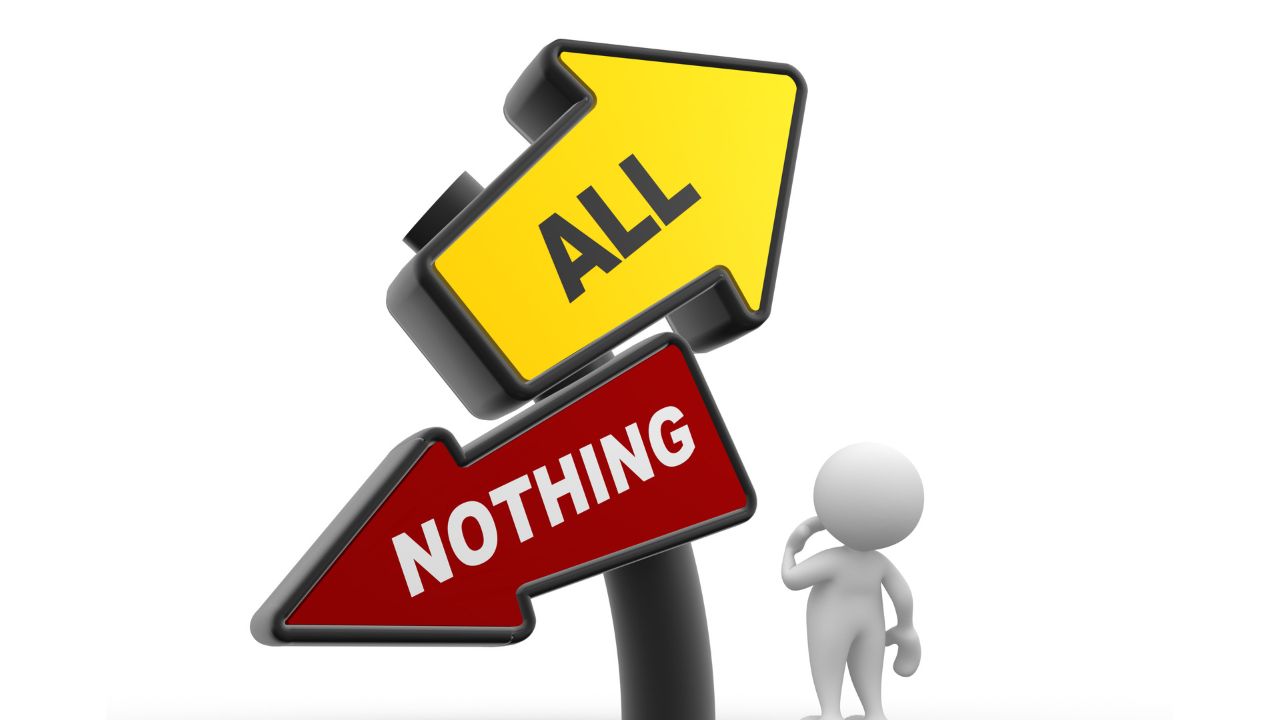
Does a small mistake ruin your whole day?
Do you feel best about yourself when you’ve been making all the right choices?
Would you call yourself a perfectionist, obsessing over tiny details to get them all, each and every one, just right?
This kind of thinking is called “all or nothing thinking.” And it is the enemy of progress.
“Perfectionism” is a word we hear thrown around a lot – we think it just means that someone has high standards for themselves. But believe it or not, all or nothing thinking is self-sabotage at its finest.
It is looking at a decision or situation and seeing only a binary – black or white. Success or failure. All good or all bad. It sounds like this: “If I’ve met my goal, I can feel good about myself. But if I haven’t, I’m awful.” Even if you got 70%, 80%, or 90% of the way there!
We know the whole world doesn’t work this way! Imagine feeling pressure to save all of your paycheck and believing that if you spend any of it, you are a failure. How could you manage with a mindset like this?
And yet, this negative thinking pattern plagues many and keeps them from making progress in their health. People say to themselves, “If I can’t do it 100%, I won’t do it at all.”
Think of the topic of exercise.
We all know it is good to exercise. This is something we’re taught from a young age. We hear it throughout all our lives in school, in media, and from our parents and peers.
In fact, in my brain-health-focused quickstart guide, 7 Cheap, Simple Strategies for Boosting Your Brain Performance, exercise is strategy #2 because it helps not only your body, but your brain. Exercise increases the blood flow to your brain, improving its oxygenation and therefore, its function.
And yet, many adults globally still report that they do not abide by the World Health Organization’s recommended guidelines of physical activity.
Why?
Well, of course, the reasons for anything involving a great number of people are diverse and nuanced. Some don’t feel they have the time. Some feel they lack the energy. And for some, they doubt what they could get done in their time with the energy they have would make any difference.
All of these concerns route back to all-or-nothing thinking.
“I can’t find an hour to go to the gym.” So, go for half an hour. Go for fifteen minutes!
“I am so tired.” Take a walk. You don’t have to go very fast or very hard. When the endorphins kick in, you will wake up – and then you will feel better than you would have if you had napped.
“A little bit won’t make a difference.” A little bit will make more of a difference than nothing at all! Especially over time. A 20-minute walk each day over a year adds up to almost 600 km. I would say that 600 km walked is a very big difference, wouldn’t you?
This is just one prominent example of an area where all or nothing thinking trips up individuals trying to improve their lives. No matter what decisions or lifestyle changes you are trying to make, don’t fall into this trap.
Remember: you don’t have to give it your all, all the time. You just have to give it more than nothing at all. Consistency compounds and what you do consistently will bring change into your life. Your choices bring about your results. Choose wisely and give yourself enough grace to continue choosing wisely!
Make today your masterpiece!
Florina
Get My Blog Posts Right in Your Inbox Every Week
Make your mental health a priority. Receive tips and strategies for living well – mentally, physically, and emotionally – every week.
Get My Free Guide: 7 Cheap, Simple Strategies for Boosting Your Brain Performance
Better focus – clearer memory – faster cognition – more mental clarity – improved intellect…
Your brain is capable of beautiful things. If you don’t think you’re getting the most out of your cranial supercomputer, you can reap the benefits of these 7 simple strategies for the low, low price of “free.”